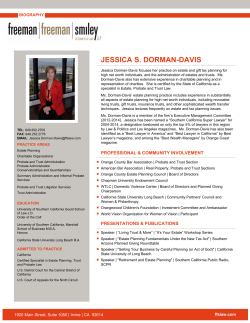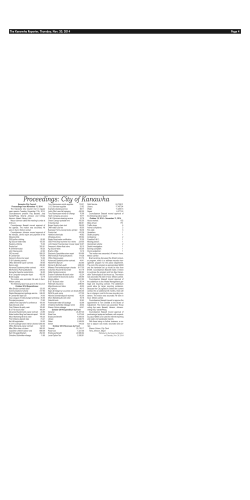
What is Probate?
What is Probate? This Special Report is brought to you by HOOK LAW CENTER Legal Power for Seniors Tel: 757-399-7506 Fax: 757-397-1267 Locations: Virginia Beach 295 Bendix Road, Suite 170 Virginia Beach, VA 23452 Suffolk 5806 Harbour View Blvd. Suite 203 Suffolk, VA 23435 Get the Latest from Hook Law Center On the Web: hooklawcenter.com "Like" Us on Facebook "Connect" with Us on Linkedin "Friend" Us on Twitter This report is not intended as a substitute for legal counsel. While every precaution has been taken to make this report accurate, Hook Law Center assumes no responsibility for errors or omissions, or for damages resulting from the use of the information in this report. Probate is the process by which a deceased person’s property, known as the “estate,” is passed to his or her heirs and legatees (people named in the will). In Virginia, the entire process is supervised by the Circuit Court and usually takes about a year; however, substantial distributions from the estate can be made in the interim. WHAT PROPERTY IS SUBJECT TO THE PROBATE PROCESS? The probate estate includes all property held in the decedent’s name. Certain kinds of property, such as property owned jointly by the deceased and another person, real property, life insurance, retirement plan assets, and property held in trust, are not part of the probate estate and are not subject to the probate process. In Virginia, unless the will directs the executor to sell the decedent’s real property, the real property passes directly to the beneficiaries named in the will and is not part of the probate estate. Jointly owned bank accounts pass automatically to the surviving owners upon the death of one of the owners without going through probate. Retirement plan assets pass to the designated beneficiary without going through probate. The nonprobate property, however, is part of the decedent’s taxable estate (see below). HOW IS THE PROBATE PROCESS STARTED? First, the original will and death certificate are filed with the Clerk of the Circuit Court by an interested party. Unless the will has a self-proving affidavit attached, the decedent’s signature on the will must be proven by having one of the witnesses to the will appear and testify under oath. After the decedent’s signature is proven, the executor named in the will is appointed by the court. Unless surety is waived in the will, the executor must have an insurance company post surety for his promise to faithfully execute the terms of the will. The clerk will also prepare a list of the decedent’s heirs at law (i.e. the people who would have taken the estate if there had been no will). Within 30 days after the executor has been appointed, he must mail a notice to each of the decedent’s heirs at law (usually the surviving spouse, children, and children of any deceased children) and to those persons named as beneficiaries in the will. © 2012 Hook Law Center All rights reserved. Hook Law Center 757-399-7506 www.hooklawcenter.com What is Probate? pg 2 WHAT IS THE PROBATE TAX? Upon probate of the will, the clerk will collect a probate tax. The tax is imposed on the value of all intangible property wherever located and the value of the real and tangible property located in Virginia. The following are examples of property not included in the valuation of the estate for purposes of the probate tax: Property passing by the exercise of a power of appointment. Property held jointly with right of survivorship. Insurance proceeds, unless payable to the estate. Property that passes by inter vivos trust. Bonds payable on death to a named beneficiary. The probate tax rate is $1.33 per $1,000 of value of probate property. WHAT DOES THE EXECUTOR DO? The executor is responsible for collecting the probate property and for paying all debts of the estate. Within 4 months of his appointment, the executor must file with the Commissioner of Accounts an itemized list, known as an “inventory,” of the probate property, including the value of each item. In 2009, if the value of the decedent’s taxable estate exceeded $3,500,000, the executor had to file an estate tax return within nine months of the date of death. This is true even if no estate tax is owed. In 2010, there is no federal estate tax, but in 2011 it returns with a $1,000,000 exemption level. The executor must also file the decedent’s final income tax return and an income tax for the estate if the estate earns more than $600 of taxable income. To ascertain claims against the estate, the executor may request that the Commissioner of Accounts hold a Debts and Demands hearing after publishing a notice of the hearing in the newspaper. Creditors must present any claims they have against the estate to the Commissioner at the hearing. Within 60 days of the hearing, the Commissioner will file a report of sufficiently proven debts. Prior to distribution of the estate, the executor may petition the Circuit Court for an Order of Distribution. Compliance with the Order of Distribution procedure will afford the executor full protection against demands of creditors. As his or her final responsibility, the executor must file an accounting with the probate court showing the income and expenditures of the estate administration. Hook Law Center 757-399-7506 www.hooklawcenter.com What is Probate? pg 3 This Special Report is brought to you by HOOK LAW CENTER Legal Power for Seniors Tel: 757-399-7506 Fax: 757-397-1267 Hook Law Center Locations: Get the Latest from Hook Law Center Virginia Beach 295 Bendix Road, Suite 170 Virginia Beach, VA 23452 On the Web: www.hooklawcenter.com Suffolk 5806 Harbour View Blvd. Suite 203 Suffolk, VA 23435 "Connect" with Us on Linkedin 757-399-7506 "Like" Us on Facebook "Follow" Us on Twitter www.hooklawcenter.com
© Copyright 2026











